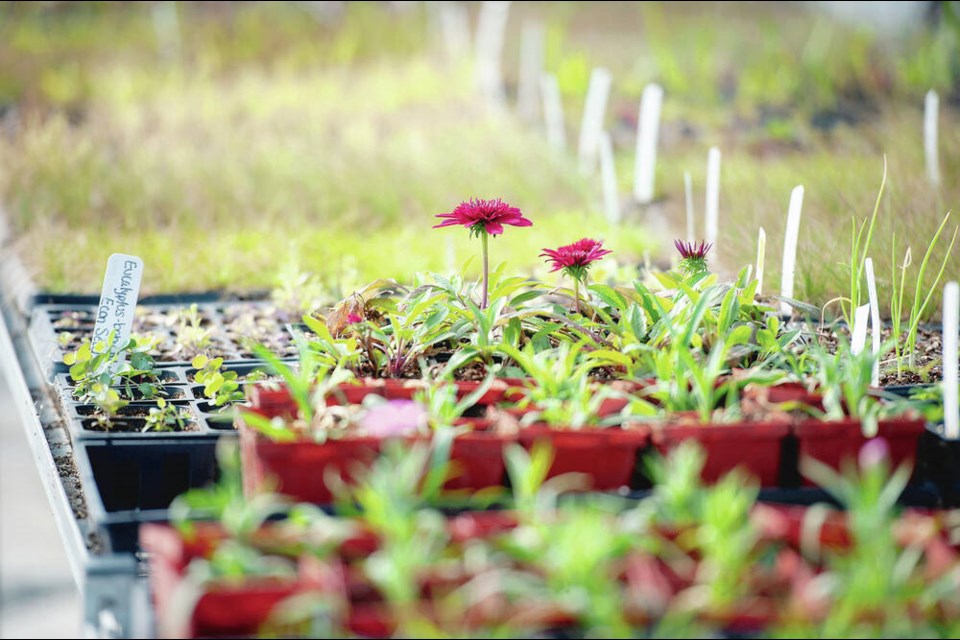From shivering in fleece to sweltering in light summer clothing, the shift came almost overnight as the cooling La Nina weather pattern was replaced by the warming El Nino. As temperatures rose, most of us still had warm sweaters and fleece tops in our laundry hampers. I had a fire built and ready to light in the wood stove.
The sudden change was bad news for gardeners who, like me, had held off seeding and transplanting early vegetables because or cold, rainy weather. Then, all of a sudden, it was too hot to plant. At the time, around mid-May, I joined many other gardeners in the search for cool places to keep transplants safe until temperatures moderated.
As we chatted one day about the effect of heat on gardens, a friend offered me some lightweight curtaining she was about to discard. It will be handy to have at the ready for suspending as needed over heat-sensitive plants like lettuce and peas, carrot and beet seed beds, and young cabbage, broccoli and cauliflower transplants. Horticultural shade cloth is available at various home and garden supply outlets. Lee Valley Tools lists it. At the time of this writing, West Coast Seeds’ shade cloth was “out of stock.”
Forward hoe! I watched the man for a while as he, in what seemed a peculiar motion, pushed a long-handled tool ahead of him as he proceeded down the gravel path of a show garden in Holland.
I remembered that man as carpets of small weeds emerged on plots where compost had been spread. Exhausted at the thought of pulling all those weeds, I realized I had such a hoe, or a variation on the type.
It was one of my father’s tools that I inherited, along with a regular “pull” hoe and a long-handled shovel and digging fork. The sturdy old tool was a “push” hoe, commonly called a Dutch hoe. Most have a straight, rectangular shaped blade. My father’s has a cutting edge shaped in a broad arc. The long handle has a patent number etched into it and “A and A MFG. CO., GURDON, ARK.”
The hoe made short work of the weeds as I pushed the blade effortlessly under them, just beneath the soil surface. In the sun and heat they quickly withered and disappeared.
Beeched. Following a column describing a long established camellia blooming in two different colours this spring, gardeners have written to describe similar variations appearing in plants after having remained constant in their growth and flowering patterns for deccades.
Then Gisela, my neighbour over the back fence, appeared one day with a little nosegay of tree seedlings in her hand. The ground under and around her over 20-year old beech tree had become full of seedlings. She’d already gathered two buckets full of them and a week ago some were still sprouting and the ones she’d missed were growing fast.
What prompted the tree into such procreative excess? Perhaps the changing, challenging weather and droughts of recent years.
GARDEN EVENTS
Plant sales. The Friends of Government House Gardens Society have opened the Plant Nursery, across from the Tea Room at Government House, 1401 Rockland Ave. in Victoria, from Tuesday through Thursday, 10 a.m. to 2 p.m. Most of the plants will be sold for $8, payable by debit or credit cards only.
Mill Bay show and sale. The Mill Bay Garden Club will host the 74th Annual Community Flower and Garden Show on Saturday, June 3, 9 a.m. to 2 p.m. in the Coble Hill Community Hall, 3550 Watson Ave. The event includes a display of flowers, fruit and vegetables submitted for competition, a silent auction, garden related vendors, a strawberry tea, and a plant sale. Master gardeners will be on hand to answer questions.
CED Workshops. The Compost Education Centre, 1216 North Park St. in Victoria, is offering the following workshops on Saturday, June 3. For information and registration, call 250-386-9676, email [email protected], or go online at compost.bc.ca/publicworkshops.
* Composting Basics, 10 a.m. to 12 p.m. Learn the recipe for success in producing compost that is rich in beneficial microorganisms and nutrients.
* Winter Vegetable Growing, 1 to 3 p.m. Our climate makes it possible to harvest produce from our gardens during the dark days of winter. Learn when to sow seeds for the vegetables you want and how to protect the plants in winter.



